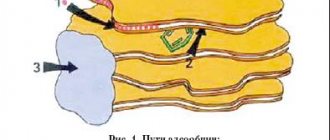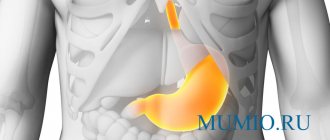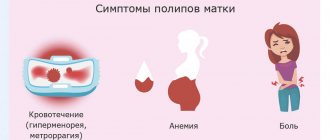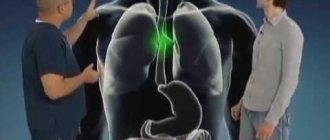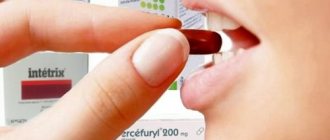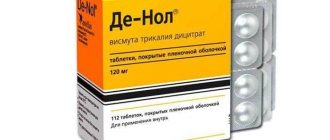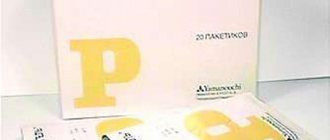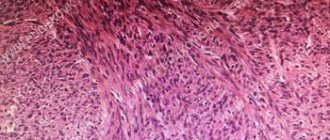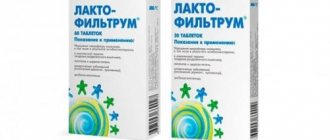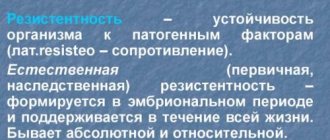Phosphalugel and De-Nol are used in complex treatment regimens for the gastrointestinal tract. These drugs are used to treat patients with metabolic disorders, pain, heaviness and discomfort in the abdomen. These drugs belong to different pharmacological groups and can be used together in the treatment of gastritis, gastric and duodenal ulcers.
De-Nol does not belong to the group of antibacterial agents, but it increases the effectiveness of anti-Helicobacter treatment and regenerates the gastric mucosa. Phosphalugel neutralizes high acidity, coats the intestinal walls and exhibits protective properties. Both products accelerate the regeneration of the mucous membrane and improve the patient’s quality of life.
How they affect the body
The drugs have different properties.
De nol
De-nol has antibacterial, antiulcer and gastroprotective effects, and is active against the bacterium Helicobacter pylori. Its active ingredient is bismuth tripotassium dicitrate.
De-Nol has antibacterial, antiulcer and gastroprotective effects.
After oral administration, the bismuth drug enters the acidic environment of the stomach, where it forms a protective film on the surface of erosions and ulcers and stimulates the growth and division of cells in the defect area. It increases the resistance of the mucosa to the effects of hydrochloric acid, pepsin, bile salts and enzymes, while simultaneously reducing the activity of pepsin and pepsinogen.
De-Nol has an astringent effect, forming a thin film on the surface of the mucosa, which protects against further cell destruction. The medication is detrimental to bacteria that provoke an inflammatory process in the stomach. Due to this effect, the healing process of ulcers and other defects is accelerated. Phosphalugel neutralizes the aggressive effects of hydrochloric acid, promoting mucosal regeneration and eliminating burning and pain.
De-Nol suppresses the proliferation of Helicobacter pylori, which is the main cause of gastritis and stomach ulcers. The active substance is bismuth dicitrate, which has the following effects:
- When taken orally, the drug forms a protective film on the surfaces of damaged areas of the gastric mucosa.
- Accelerates wound healing. The active substance reduces the sensitivity of tissues to hydrochloric acid and digestive enzymes, suppresses the action of pepsinogen and pepsin.
- Protects the stomach from the negative effects of anti-inflammatory and cytostatic drugs, alcohol and toxins.
Phosphalugel contains aluminum phosphate, which has the following properties:
- Neutralizes hydrochloric acid, envelops the walls of the stomach. After entering the digestive system, the substance reacts with gastric juice. The acidity level decreases to a normal value, and no re-emission of acid is observed.
- Forms a protective film. The mucous membranes are covered with a layer of active substance, which reduces sensitivity to hydrochloric acid and digestive enzymes.
- Aluminum phosphate binds toxins, removing them with feces.
Indications and contraindications
De Nol and Phosphalugel belong to different groups of pharmacological action.
Thus, De Nol has astringent properties and has an anti-inflammatory and antiseptic effect on the gastrointestinal tract. By covering the surface of the mucous membrane of the stomach and duodenum with a thin protective membrane, the drug neutralizes the destructive effect of stomach acids on the walls of organs. This action helps restore the damaged integrity of the ulcerated walls of the digestive system, as well as reduce the inflammatory process until it stops completely.
Phosphalugel, enveloping the inner surface of the digestive organs, additionally neutralizes the irritating effect of gastric acids on the walls of the organs, adsorbing them on itself and normalizing the pH of the stomach and intestines.
Both the astringent antiseptic De Nol and the antacid drug Phospholugel are used for the same pathologies:
- treatment of exacerbations of gastritis against the background of increased or normal acidity;
- ulcerative damage to the walls of the duodenum and stomach;
- heartburn accompanying pathological reflux of stomach contents into the esophagus;
- digestive disorders of non-ulcerative etiology;
- irritation of the walls of the stomach and duodenum with medications, alcohol or poor-quality food.
Description of the drug Phosphalugel
The drug belongs to the group of antacids - substances that regulate the production of gastric juice, reducing its acidity. In addition, the product has an enveloping and adsorbing effect. This medicine is used to treat:
- ulcerative lesions of the duodenum and stomach;
- gastritis occurring with increased and decreased secretory function;
- dyspeptic disorders occurring without damage to the digestive organs;
- with reflux esophagitis;
- for diaphragmatic hernias;
- for digestive tract dysfunctions caused by taking certain medications, alcohol or food and non-food poisoning.
Which is better: De Nol or Phosphalugel
What is better to take for gastritis or peptic ulcer? An exact answer to this question can only be given by a doctor who monitors the patient’s condition and knows the individual characteristics of his disease. In some cases, simultaneous administration of Phosphalugel and De-Nol is indicated.
In the fight against ulcers and irritable bowel syndrome, De-Nol is considered the most effective. For gastritis, Phosphalugel is most often prescribed, which is effective for unpleasant symptoms.
It is difficult to determine which remedy is more effective. The drugs have different mechanisms of action. They are not analogues, so they cannot replace each other. The drug heals defects, preventing the spread of Helicobacter pylori infection. Phosphalugel is used to eliminate heartburn, sour belching or heaviness in the stomach. It is also effective in cases of poisoning from alcoholic beverages or poor-quality food.
In case of exacerbation of ulcerative processes, De-Nol is considered more effective.
There is no clear answer to the question of which drug is better, because their effects are different. They are not analogues, and independent replacement of drugs can harm the body. And simultaneous use is only welcome. The combination of De-nol with Phosphalugel forms the basis for the treatment of gastritis and ulcerative processes of the digestive tract.
During exacerbations of chronic gastrointestinal diseases, De-nol is needed, which can heal ulcers, form a protective membrane on the gastric mucosa and stop the proliferation of Helicobacter bacteria.
If you need to eliminate belching, prevent heartburn or cope with other minor gastrointestinal disorders, then Phosphalugel will be your faithful assistant. It is also a good measure to prevent gastric problems.
The use of the drug "De-nol" separately from other drugs
The drug is classified as an astringent medicine. Bismuth subcitrate forms the basis for the treatment of diseases of the digestive tract. "De-nol" creates a protective film against hydrochloric acid and other aggressive factors. It is produced in tablets that are taken orally. In cases of exacerbation of gastritis and ulcers, the product exhibits a high level of effectiveness. "De-nol" is used to treat irritable bowel syndrome. Patients with a functional dyspeptic condition take a drug that shows good results against the disease.
The drug has proven itself in the fight against bacteria directly associated with peptic ulcers and gastritis (H. pylori). It can also have a detrimental effect on other pathogens:
- Yersinia;
- rotoviruses;
- clostridia;
- E. coli;
- Shigella
The drug creates a certain barrier not only against bacteria, but also protection against the penetration of toxic substances. They can enter the body from the outside in the form of medications (cytostatic substances and non-steroidal anti-inflammatory drugs), alcoholic beverages.
Is it possible to take Omez and Phosphalugel together?
Which is better Omez or Phosphalugel? This question interests many patients who have problems with the functionality of the gastrointestinal tract. The first drug reduces the acidity of the stomach contents, thereby eliminating unpleasant symptoms. Phosphalugel is an antacid that protects the digestive mucosa from damage by hydrochloric acid. The combined use of these drugs enhances the overall effect of treatment.
Indications for prescribing the drug “Phosphalugel”
Both drugs are used for:
- stomach and duodenal ulcers;
- gastritis;
- IBS;
- reflux disease.
Medicines help with errors in diet and gastrointestinal diseases associated with Helicobacter pylori.
There are a certain number of indications for prescribing the drug for damage to the digestive tract. These include:
- ulcers of the stomach and intestinal mucosa;
- gastritis in exacerbation with varying acidity;
- heartburn;
- dyspeptic condition;
- dyspepsia not associated with ulcers;
- reflux gastritis;
- functional lesions of the digestive tract.
The course of treatment is individual for each patient. It is allowed to combine De-nol and Phosphalugel (the drugs and regimen are determined depending on the indications and the degree of damage to the digestive tract).
The range of indications for the use of the drug is very similar to when it is necessary to use De-nol. Therefore, they can be combined in a scheme for such pathologies as:
- peptic ulcer;
- diaphragmatic hernia;
- dyspepsia of various origins;
- reflux esophagitis;
- diarrhea not related to ulcerative disease of the digestive tract.
Before you start treatment, you need to read the instructions to know how to take “De-nol” with “Phosphalugel”. The dosage and frequency of administration are determined depending on the indications and severity of the patient’s condition.
If there are diseases of the digestive system and there are indications, the gastroenterologist will tell you how to take “Phosphalugel” and “De-nol” together. They should be taken separately from other drugs included in the treatment regimen. The products “De-nol” and “Phosphalugel” have good compatibility, and therefore they can be taken several hours apart.
Recommendations for taking Phosphalugel
The drug should be taken pure or diluted with water at room temperature. Adults and children are advised to take several sachets of the drug during the day, depending on the severity of the condition.
In case of ulcerative lesions of the mucous membrane of the stomach and intestines, a sachet of medicine must be taken an hour after meals. For functional disorders of the gastrointestinal tract, Phosphalugel is taken in the morning, afternoon and evening.
Patient reviews of De Nol and Phosphalugel
Andrey, 28 years old, St. Petersburg: “Phosphalugel deserves many good words for its effectiveness, versatility and convenient shape. If you ate a low-quality product and felt nauseated, drink Phosphalugel immediately. It will definitely help. It also quickly relieves heartburn.”
Vera, 54 years old, Krasnodar: “I took De-nol for a month as prescribed by a doctor for a duodenal ulcer. An effective drug. I took Phosphalugel in combination with it. The ulcer quickly healed, and the stomach pain, heartburn and constant belching stopped bothering me. Five years have passed and I don’t remember the ulcer.”
[morkovin_vg video=”tIVDrWKl5H0;OX-efLJx5jM;0UdiVveL6LY”]
Risks of uncontrolled use of medications for the treatment of gastritis: doctors' answer
Uncontrolled use of the drug may not provide the desired therapeutic effect. The disease will progress, and conservative therapy may not be effective in later stages. The use of symptomatic drugs blurs the clinical picture and complicates diagnosis. Therefore, it is necessary to inform the attending physician which groups of drugs were used as first aid.
De-Nol, Phosphalugel and other gastrointestinal drugs should be used after a comprehensive examination as prescribed by a doctor. Medicines may be taken as symptomatic treatment along with medications to treat the underlying cause of the disorder.
General description of Fasphalugel
Phosphalugel is an antacid. The main active ingredient of the drug is aluminum phosphate. The product has a helium form and a pleasant aftertaste. The advantage of Phosphalugel is that it restores the normal acidity of gastric juice. In this case, it does not become alkalized.
Phosphalugel produces the following effects:
- neutralizes excess amounts of hydrochloric acid without affecting its secretion;
- quickly relieves pain (the gel has an enveloping effect);
- accelerates the regeneration of damaged mucous membranes;
- protects the inner surface of the stomach from damage by bacteria and hydrochloric acid.
Phosphalugel can be purchased only in one form - gel. It is intended for oral use. If this drug is not suitable for the patient, then it can be replaced with a drug such as Almagel. Phosphalugel and Omez are prescribed individually for each patient.
Drug compatibility
The drugs can be used for treatment together, but not in one go. The interval between doses should be at least 2-3 hours. Remember, antacids affect the absorption of bismuth, which includes De-Nol.
The medications are compatible, so they can be part of complex treatment regimens for stomach diseases.
Medicines are incompatible with ethyl alcohol, so during therapy you should refrain from drinking alcohol.
Reviews about the drug
Many patients receiving treatment, the regimen of which includes the listed medications, leave positive feedback about De-nol (De nol) and Phosphalugel. They have long proven themselves in the fight against inflammatory diseases of the digestive system. The drugs are prescribed by a gastroenterologist, and many patients who take them together according to the regimen already notice an improvement in their well-being in the near future. The specialist will explain how to take “Phosphalugel” and “De-Nol” together,” because the regimen is selected for each individual. A month after the start of treatment, discomfort, pain, heartburn and other unpleasant symptoms of exacerbation of peptic ulcer or gastritis disappear.
What drugs should you not take Trimedat with: list of prohibited drugs
The instructions indicate that drug interactions with basic substances of other pharmacological groups are not described. Based on the mechanism of action, as well as to prevent deterioration in therapeutic effectiveness, Trimedat should not be used simultaneously with drugs that affect intestinal motility:
- Peristalsis stimulants (Metoclopramide, Cerucal).
- Antispasmodics (Drotaverine, No-shpa).
- Some laxatives (Mukofalk).
You should not drink alcoholic beverages during the course of therapy. It is also important to adhere to dietary recommendations with the limitation or exclusion of fatty, fried foods.
To prevent negative consequences, you should consult your doctor before combined use.
Can I take it at the same time?
De-Nol take 1 tablet 30 minutes before meals and before bedtime. Can be used in 2 pcs. 2 times a day. Dosages for children are set at the rate of 8 mg/kg. The effectiveness of the drug is reduced by fermented milk products, juices and sour fruits.
Before use, the contents of the sachet are dissolved in warm water. For gastritis, the medicine is taken before meals, for ulcers - after meals. To get rid of heartburn, Phosphalugel is used immediately after the appearance of an unpleasant symptom. Children under 6 years old are given half a sachet. The course of treatment lasts 2 weeks.
Phosphalugel is used 1-2 sachets 2-3 times a day.
Phosphalugel can be taken if pain occurs. De-Nol is prescribed 3-4 times a day half an hour before meals. The course of treatment depends on the pathology.
De-Nol is prescribed to children from 4 years of age, and Phosphalugel is given even to newborns (if necessary).
People over 12 years of age can take the medication no more than 4 times a day, 1 tablet. You need to drink it only with water. The drug is taken 30 minutes before meals and before bedtime. In exceptional cases related to the patient’s condition, the gastroenterologist prescribes 2 tablets of the drug “De-nol” at a time. Children are prescribed an individual dosage.
Since the drugs have different effects and belong to different pharmacological groups, some patients are prescribed to take De-Nol and Phosphalugel at the same time. The compatibility of the drugs is beyond doubt.
How to take De-Nol and Phosphalugel together? To prevent medications from neutralizing each other’s effects, their administration is spaced out over time. De-Nol is taken twice or four times a day. In the first case, you should take one tablet, in the second - two, since the daily dose in any case is 4 tablets.
It is very important not to drink or eat anything for half an hour before taking De-Nol and half an hour after taking it. It is prohibited to take other medications during this period, including Phosphalugel. How to take Phosphalugel while taking De-Nol? As a rule, the following scheme is recommended:
- De-Nol is taken before meals; 30 minutes after taking the tablet you can eat.
- Phosphalugel is taken after meals. Depending on the type of disease, the drug is taken either immediately after eating, or an hour later, after the patient has eaten something.
Admission rules
For treatment to be effective, for medications to complement each other and not weaken their own effects, certain recommendations must be followed. These include:
- “de-nol” is recommended to be drunk 30-40 minutes before meals; during this time you should not drink water, juice or other liquids;
- "phosphalugel" is taken only after meals after 1.5-2 hours;
- The simultaneous use of medications is prohibited, since this reduces the therapeutic effectiveness of both medications.
Differences and similarities of drugs
The action of both drugs is aimed at protecting the mucous membrane of the stomach and duodenum from aggressive factors. However, they belong to different pharmacological groups: De-nol is a gastroprotector, Phosphalugel is an antacid.
De-nol is available in tablet form. They are biconvex in shape, with “gbr 152” embossed on one side and a square with rounded corners and broken sides on the other.
Both drugs have a local effect and are practically not absorbed into the blood. Excreted in feces. A very small percentage that enters the plasma is excreted by the kidneys.
Both drugs are used for disorders of the digestive tract. De-nol forms the basis for the treatment of:
- ulcerative lesions of the stomach and duodenum - in the acute phase;
- gastritis and duodenitis - in the acute phase;
- dyspepsia;
- irritable bowel syndrome accompanied by diarrhea.
Phosphalugel has the same indications. It is also used for high levels of gastric acidity, pancreatitis, reflux esophagitis, and diaphragmatic hernia. Useful for poisoning, intoxication to cleanse the gastrointestinal tract of pathological impurities (toxins, alkalis and acids).
Phosphalugel is approved for use for all age groups, including infants, and has a minimal number of contraindications and side effects.
Despite the fact that the percentage of bismuth absorption into the blood is insignificant, there is a threat to pregnant and lactating women. Therefore, they are prohibited from taking medications with bismuth.
Contraindications for De-nol also include:
- individual intolerance to components;
- children under 4 years of age;
- severe renal dysfunction.
De-Nol is contraindicated in children under 4 years of age.
Phosphalugel is prohibited for use only in patients with phosphate intolerance and Alzheimer's disease.
How to drink
De-nol tablets are taken orally, 1 piece with clean water, half an hour before meals and at night (4 tablets in total). Or another dosage regimen: 2 tablets 2 times a day 30 minutes before meals.
For children 4-8 years old, the daily dose is calculated using the formula: 8 mg per 1 kg of body weight, which is then divided into 2 doses. Children 8-12 years old are given 1 piece. 2 times a day.
In monotherapy, De-nol is taken separately with other medications and food. Antacids, fermented milk products, fruits and fruit juices can reduce its effectiveness, so the time interval should be at least half an hour.
Phosphalugel is taken 1-2 sachets up to 3 times a day, the maximum dosage is 6 sachets. It can be diluted with clean water. The exact dose and regimen is selected by the doctor, taking into account the severity of the disease. In some cases, a single dose is sufficient.
Phosphalugel is taken 1-2 sachets up to 3 times a day, the maximum dosage is 6 sachets.
The time of administration varies depending on the stomach disease: for gastritis, the gel is taken before meals, for ulcers - 2 hours after eating, for vomiting and nausea - immediately after the onset of unpleasant symptoms.
Children over 6 years old are prescribed an adult dose, from six months to 6 years - no more than ½ sachet, under 6 months - no more than ¼ sachet at a time.
It is not recommended to use the drug for more than 2 weeks, unless otherwise recommended by your doctor.
Phosphalugel may affect the absorption of medications into the blood. Therefore, patients undergoing a therapeutic course with other medications should carefully read the instructions for use to determine the best time to take Phosphalugel for more effective treatment.
In complex treatment, De-nol is taken 30 minutes before meals, and the antacid is taken 1.5-2 hours later. This prevents the drugs from affecting each other.
In complex treatment, De-nol is taken 30 minutes before meals, and the antacid is taken 1.5-2 hours later.
Among the side effects of De-nol are allergic reactions on the skin (rash, itching) and negative manifestations of the digestive system (nausea, vomiting, constipation and increased bowel movements). With drug withdrawal, all of the above phenomena disappear. Long-term use of high doses of bismuth preparations leads to its accumulation in the central nervous system, which can provoke the development of encephalopathy.
The most common side effect of Phosphalugel is constipation. It is more likely to affect older people and bedridden patients taking antacid medications. To prevent constipation, you can increase your water intake or use a laxative.
Restrictions on taking Phosphalugel also apply to patients with liver cirrhosis and heart and kidney failure.
"Phosphalugel", composition
The basis of the drug is aluminum phosphate salt. Belongs to the group of antacids. One dose of “phosphalugel” is 10.4 or 12.38 mg of active ingredient.
Basic properties:
- adsorbent;
- enveloping;
- antacid.
Phosphalugel
Indications
The medication can be prescribed to the following groups of patients:
- adults
- ulcerative pathology of the gastrointestinal tract;
- chronic gastritis, occurring with neutral or increased acidity of its own contents;
- presence of diaphragmatic hernia;
- previously diagnosed reflux esophagitis;
- dyspeptic syndrome having a non-ulcer etiology;
- functional intestinal disorder, manifested by the occurrence of frequent bowel movements;
- intoxication syndrome, occurring with a predominance of intestinal symptoms, caused by various drugs, infectious agents, chemicals, alcohol;
- children
- esophagitis;
- gastroesophageal reflux;
- gastritis;
- ulcerative defects of the mucous membrane of the digestive organs.
Contraindications
Who should not be recommended to take phosphalugel:
- patients with intolerance to any component of this medicine;
- persons with kidney disease in the stage of decompensation.
It is important to know! The drug is approved for use during gestation and lactation. The only condition is to follow the recommendations for dosing the product and not to exceed the maximum amount of the substance per day.
Mode of application
The medication is taken orally. Can be consumed pure or pre-diluted with a small amount of liquid.
Recommended dosage regimens:
- adult patients, children over six years of age - it is allowed to take no more than two sachets per dose, the frequency should not exceed three times a day
- reflux disease - consumed immediately after meals, additionally before bedtime;
- ulcerative pathology - drink after two hours after eating, if pain occurs;
- gastritis or dyspepsia - drink before meals;
- functional disorders - taken on an empty stomach in the morning, before bedtime;
- children
- up to six months - four grams of medicine (about one teaspoon) are prescribed after each breastfeeding (or bottle feeding);
- after six months - the dose is increased to eight grams, two teaspoons, the frequency of administration is four.
Is it possible to take phosphalugel and an antibacterial agent together?
Analogs
The following are possible substitutes for the pharmacological agent:
| Drug name | Active substance | Maximum therapeutic effect | price, rub. |
| smecta | dioctahedral smectite | 20-30 minutes | 123-525 |
| gastal | hydrotalcide, magnesium hydroxide | same | 117-688 |
| almagel | algeldrate, magnesium hydroxide | same | 108-564 |
| gaviscon | alginate, sodium bicarbonate, calcium carbonate | same | 132-637 |
Reviews
“My constant problem is heartburn after eating spicy or fatty foods. I don’t have the willpower to refuse such dishes, so I save myself by using “phosphalugel”. This is a good and effective drug."
Larisa, 38
“After giving birth, I experienced an exacerbation of stomach inflammation. Phosphalugel is the only medicine that can be safely taken while breastfeeding. It was the only thing that saved me.”
Galina, 28
Price
The cost of the drug ranges from 18 rubles per sachet to 356 rubles per package. The price is affected by the number of sachets in a cardboard box.
special instructions
According to the instructions for use of medications, Phosphalugel and De-Nol should be taken with caution in certain conditions.
The use of Phosphalugel during pregnancy and breastfeeding is allowed. De-Nol is undesirable in such cases.
Childhood
The drugs are not prescribed to patients under 4 years of age.
Elderly age
In the presence of concomitant chronic diseases, older patients may be prescribed lower doses of drugs. Taking medications together in this case increases the risk of constipation.
It is important to know how much you can take. The maximum duration of therapy with De-Nol is 2 months. Long-term use of the medicine may negatively affect the functioning of the kidneys. The active ingredient may turn the tongue and stool dark. When diagnosing Helicobacter pylori, bismuth is used with anti-Helicobacter treatment.
If Phosphalugel causes constipation, it is recommended to drink more liquid, which softens the stool. The active substance interacts with other components, reducing the effectiveness of drugs. Therefore, in combination treatment, it is necessary to obtain prior consultation with a doctor and take Phosphalugel separately.
Before starting therapy, it is recommended to familiarize yourself with contraindications to the use of the products. Taking De-Nol is contraindicated in patients with the following pathologies:
- individual intolerance to the active or auxiliary components;
- renal failure in the acute stage;
- allergy to bismuth derivatives and substances with antibacterial properties;
- internal bleeding;
- micronutrient deficiency;
- during pregnancy and breastfeeding.
Taking De-Nol may cause undesirable reactions: nausea, constipation, allergies. Long-term use of bismuth is fraught with encephalopathy.
Phosphalugel is well tolerated. In rare cases, it can cause constipation in people with a sedentary lifestyle.
After stopping the medication, the side effects disappear on their own. To avoid overdose and increase unwanted side reactions, De-Nol is not taken together with other medications that contain bismuth.
Reviews from doctors
Elizaveta Igorevna, therapist, Naberezhnye Chelny: “I consider De-nol to be an effective broad-spectrum drug. I use it in the treatment of erosive gastritis and ulcers of the stomach and duodenum. There were cases when patients complained of feeling unwell after taking the pills, but such conditions went away on their own within 2-3 days.”
Viktor Sergeevich, therapist, Kazan: “It has been proven that increased acidity contributes to the appearance of erosions and ulcers in the stomach. To prevent such conditions, I prescribe Phosphalugel to my patients. It reduces the level of hydrochloric acid, gently envelops the mucous membrane and improves the patient's condition. The price of the drug is reasonable and the quality is high.”
Reviews
Ekaterina, 35 years old, therapist, Naberezhnye Chelny: “Phosphalugel and De-Nol are effective drugs used to treat gastritis and ulcers. Active substances protect the gastric mucosa from the effects of aggressive factors and promote the healing of erosive defects. When exposed to an acidic environment, the drug forms insoluble compounds that form a protective film. During treatment, nausea, a feeling of heaviness in the stomach, and constipation may occur. Unpleasant symptoms disappear after stopping the drugs.”
Vera, 55 years old, St. Petersburg: “The gastroenterologist prescribed Phosphalugel and De-Nol during the acute period of a stomach ulcer. After the first dose, the abdominal pain became less pronounced, and heartburn and belching stopped appearing at night. The examination showed that the ulcerative defects had healed. Signs of the disease have not appeared for 5 years.”
Side effects of De-Nol and Phosphalugel
De-Nol sometimes causes allergic reactions in the form of skin rashes and itching, digestive disorders (nausea and vomiting, slowing or accelerating intestinal motility).
When using medications, darkening of the stool may occur.
Medicines are not recommended to be taken in combination with antacids, antibiotics, or non-steroidal anti-inflammatory drugs. Breaks between uses should be at least 2 hours.
Simultaneous treatment with the described medications speeds up the healing process, reduces pain and heartburn. In this case, it is necessary to correctly distribute the use of funds throughout the day. Active substances De-Nol and Phosphalugel:
- envelop the intestinal walls;
- reduce symptoms of the disease;
- exhibit anti-inflammatory properties;
- do not alkalize gastric juice;
- form a protective film on ulcerative formations and erosions;
- make the gastric mucosa more resistant to the action of hydrochloric acid and gastric juice;
- remove toxic substances and gases;
- increase mucus synthesis.
Both drugs exhibit good compatibility, protect the gastric mucosa, and act locally without penetrating into the systemic bloodstream. De-Nol is a representative of gastroprotectors in the form of tablets, Phosphalugel is an antacid.
The doctor selects the dosage and treatment regimen individually for each patient. If no other treatment protocol is prescribed, you can use the manufacturer's recommendations.
Phosphalugel can be taken in its original form or diluted with water in a ratio of 1 part gel to 2 parts liquid. The dosage depends on the indications for use:
- gastroesophageal reflux: before going to bed, after each meal;
- functional disorders of the large intestine: before meals, on an empty stomach, and also before going to bed;
- stomach ulcer: symptomatically with each attack of pain, as well as after a meal;
- gastritis, dyspeptic disorders: before meals;
- Infants are given the gel after each feeding.
The doctor can adjust the treatment regimen, change doses, and add other medications.
During therapy the following may occur:
- constipation;
- nausea;
- digestive disorders;
- stomach ache;
- allergy.
Medicines have a wide range of indications for gastrointestinal pathology in the acute phase. Like any other drug, they can cause side effects. These include:
- allergic reaction due to intolerance to certain components;
- “Phosphalugel” can provoke constipation, and “De-nol” can cause diarrhea;
- nausea or vomiting.
Due to the listed conditions, you cannot take the medication yourself. It is first necessary to consult a specialist and collect the necessary information that will prevent the development of the listed conditions. To avoid the development of complications, you should first read the instructions, which indicate how to take “Phosphalugel” and “Omeprazole” for gastritis, ulcers and other pathologies.
Composition of the drug
The active ingredient of De-Nol is bismuth subcitrate, which normalizes stomach acidity. According to the instructions, the drug is recommended for patients with the following conditions:
- gastritis;
- peptic ulcer in acute and chronic stages;
- gastroduodenitis;
- functional dyspepsia;
- Irritable bowel syndrome accompanied by profuse diarrhea.
The active ingredient coats the intestinal wall, has an astringent effect and protects the mucous membrane of the gastrointestinal tract. This prevents the progression of the ulcer and reduces the symptoms of the disease. The drug reduces the aggressive effects of gastric juice, reduces pain and the likelihood of relapse of exacerbation of the disease.
Phosphalugel is a preparation based on aluminum phosphate, agar, purified water and other excipients. Under the influence of the gel, the negative effect of acidic salt is neutralized, the activity of substances that cause gastritis and peptic ulcers is eliminated. Excipients normalize the functioning of the digestive tract. The drug is indicated for patients with the following diseases:
- gastritis;
- stomach and intestinal ulcers;
- diarrhea;
- rectal changes;
- slots;
- hernias;
- Abdominal pain.
The product has an astringent effect and helps relieve abdominal pain.
Side effects from concomitant use
Treatment of pathologies of the gastrointestinal tract with De Nol and Phosphalugel should be carried out in strict accordance with the instructions of the attending physician. You should not use these two drugs at the same time. After such joint use of drugs, side effects may develop:
- from the gastrointestinal tract, stool disorders in the form of constipation or diarrhea, nausea, vomiting may be observed;
- on the part of the immune system, reactions are possible in the form of the appearance of various rashes, itching, and red spots on the skin;
- with prolonged co-administration, pathology in the form of encephalopathy may develop on the part of the nervous system.
Treatment of peptic ulcers of the gastrointestinal tract, as well as duodenitis and gastritis with De Nol and Phosphalugel should only be carried out under the supervision of the attending physician. Accurate adherence to all doctor’s recommendations for taking medications will allow you to quickly stop the exacerbation of the disease and avoid the development of complications and side effects.
Contraindications to the use of drugs
There are certain conditions when it is temporarily or not at all recommended to be treated with the medications “De-Nol” and “Phosphalugel”, both in monotherapy and in combination. These include the following conditions:
- chronic renal failure, occurring in severe severity;
- intolerance to certain substances that form the basis of the drug or are among the additional ones;
- diabetes.
The listed conditions are not always an absolute limitation for taking medications. To clarify this issue, consultation with a specialist is necessary.
